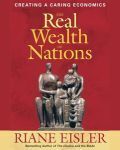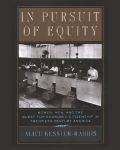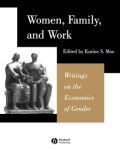Photo by Kaleidico on Unsplash

Eisler, Riane. Real Wealth of Nations. Berrett-Koehler Publishers, 2008.
Eisler proposes a new "caring economics" that takes into account the full spectrum of economic activities--from the life--sustaining activities of the household, to the life-enriching activities of caregivers and communities, to the life-supporting processes of nature. She shows how our values are distorted by the economic double standard that devalues anything stereotypically associated with women and femininity; reveals how current economic models are based on a deep-seated culture of domination; and shows how human needs would be better served by economic models based on caring. Most importantly, she provides practical proposals for new economic inventions--new measures, policies, rules, and practices--to bring about a caring economics that fulfills human needs.
Like her classic The Chalice and the Blade, The Real Wealth of Nations is a bold and insightful look at how to create a society in which each of us can achieve the full measure of our humanity.

Kessler-Harris, Alice. In Pursuit of Equity: Women, Men, and the Quest for Economic Citizenship in 20th-Century America. Oxford University Press, 2003.
In this volume, Alice Kessler-Harris explores the transformation of some of the United States' most significant social policies. Tracing changing ideals of fairness from the 1920s to the 1970s, she shows how a deeply embedded set of beliefs, or "gendered imagination" shaped seemingly neutral social legislation to limit the freedom and equality of women. Law and custom generally sought to protect women from exploitation, and sometimes from employment itself; but at the same time, they assigned the most important benefits to wage work. Most policy makers (even female ones) assumed from the beginning that women would not be breadwinners. Kessler-Harris shows how ideas about what was fair for men as well as women influenced old age and unemployment insurance, fair labor standards, Federal income tax policy, and the new discussion of women's rights that emerged after World War II. Only in the 1960s and 1970s did the gendered imagination begin to alter--yet the process is far from complete.

Moe, Karine. Women, Family, and Work: Writings on the Economics of Gender. Wiley-Blackwell, 2003.
Women, Family, and Work is a collection of original essays on a wide variety of topics related to the economics of gender and the family. Written by leading thinkers in the field, the essays apply traditional economic theory to unconventional topics, while also developing neoclassical economic thought to provide a better model of economic interactions.
12 newly-commissioned essays on the economics of labor, gender, and family life.
Juxtaposes various viewpoints, allowing readers to weigh the benefits and drawbacks of each model.
Applies traditional economic theory to unconventional topics, while also revisioning neoclassical economic thought.

